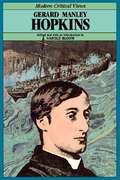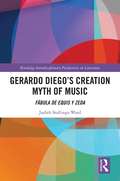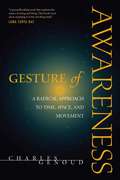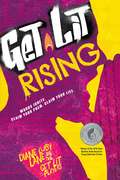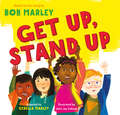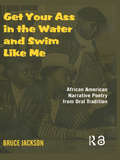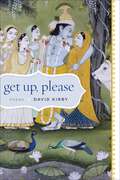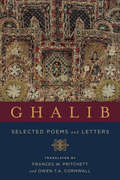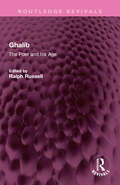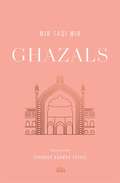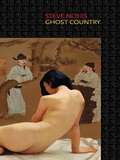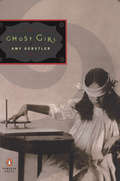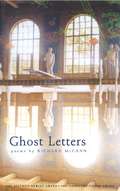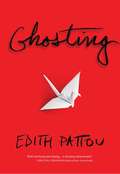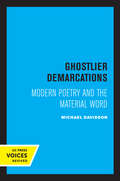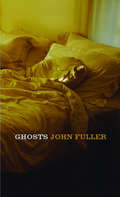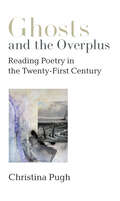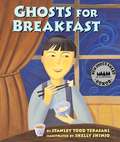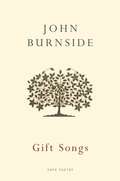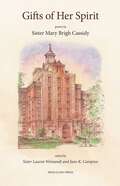- Table View
- List View
Gerard Manley Hopkins (Modern Critical Views)
by Harold BloomThe poetry is viewed in reference to his culture and surroundings, as well as within the context of his own life experience.
Gerardo Diego’s Creation Myth of Music: Fábula de Equis y Zeda (Routledge Interdisciplinary Perspectives on Literature)
by Judith Stallings-WardSince its publication nearly eight decades ago, the consensus among scholars about Fábula de Equis y Zeda, by the Spanish poet Gerardo Diego (1896-1987) remains unchanged: Fábula is an enigmatic avant-garde curiosity. It seems to rob the reader of the reason necessary to interpret it, even as it lures him or her ineluctably to the task; nevertheless, the present study makes the case that this work is, in fact, not inaccessible, and that what the anhelante arquitecto, intended with his masterpiece was a creation myth that explains the evolution of music in his day. This monograph unlocks the fullness of the poem´s meaning sourced in music’s mythical consciousness and expressed in a poetic idiom that replicates aesthetic concepts and cubist strategies of form embraced by the neoclassical composers Bartok, Falla, Ravel, and Stravinsky.
Gesture of Awareness: A Radical Approach to Time, Space, and Movement
by Charles GenoudFrom a major mind of Buddhism today comes this unique philosophical work, which hearkens back to the classical verse-form, but in a modern voice that speaks directly to the twenty-first century reader and practitioner. Gesture of Awareness involves a fascinating philosophical exploration of time, space, and movement but at the same time is a manual for an embodied "practice of exploration." Genoud is very well known to the leading lights of Buddhism today. He and his work are continuingly praised for their invention and importance. Well-versed in French and continental philosophies, as well as Eastern thought, he has produced a work that will be welcomed as a Buddhist book and a noteworthy contribution to the larger philosophical community.
Gestures: An Anthology of South Asian Poetry
by K. SatchidanandanThis anthology of poetry from the member countries of the South Asian Association for Regional Cooperation except Bhutan shares a lot of common concerns, anxieties, hopes, attitudes and visions of the present and the future.
Get Lit Rising: Words Ignite. Claim Your Poem. Claim Your Life.
by the Get Lit Players Diane Luby LaneGet to know the Get Lit Players--a group of teens who use poetry to take on the world--with this standards-based book that sheds light on teen issues through their own poetry and slam poetry performances.Get Lit Rising brings to life the true story of nineteen teen poets (the Get Lit Players) who are inspiring thousands of teens across the country through their award-winning performances of classic and spoken word poems. This book takes readers inside the private lives of these teen poets as they try to transform the lives of inner city teens in some of the toughest life circumstances. The Get Lit Players include teens who struggle with homelessness, autism, incarceration, body image, depression, and more. But they use the power of poetry to reclaim their lives and influence their friends, families, and communities. This uplifting book also offers the classic poems that have most inspired the Get Lit Players, along with their own personal response poems, and each chapter offers questions, writing prompts, and how-tos for readers to set their own inner poet free. Ending with a section for parents and educators featuring the curriculum that's already in schools throughout California, this slam-dunk shows how to get teens excited about poetry and how to create poetry groups and slams in their own communities.
Get Up, Stand Up
by Bob Marley Cedella MarleyBob Marley's music has inspired millions of listeners around the world with messages of peace, love, and truth. This third picture book adaptation of one of his beloved songs has a timely message for children: To counter injustice, lift others up with kindness and courage. As a young girl goes on with her day in school, she comes across several instances of teasing and intimidation. But with loving action and some help from her friends, she's able to make things right for herself and others. With exuberant pictures by John Jay Cabuay accompanying Marley's iconic lyrics, Get Up, Stand Up is a vibrant testament to the power we all have to make a difference.
Get Your Ass in the Water and Swim Like Me: African-American Narrative Poetry from the Oral Tradition, Includes CD
by Bruce JacksonFirst published in 2004. Routledge is an imprint of Taylor & Francis, an informa company.
Get up, please: Poems
by David KirbyIn comical and complex poems, David Kirby examines our extraordinarily human condition through the lens of our ordinary daily lives. These keenly observant poems range from the streets of India, Russia, Turkey, and Port Arthur, Texas, to the imaginations of fellow poets Keats and Rilke, and to ruminations on the mundane side of life via the imperfect sandwich. Whether remembering girls' singing groups of the 1950s or recounting a child asking his priest if his dog would go to heaven, Kirby has the ability to make us laugh, but he can also bring us to tears through our laughter.
Gettin' Old Ain't for Wimps
by Karen O'ConnorThe title says it all--delightful poems and stories to make the reader smile, laugh, and think.
Ghalib
by Muhammad MujibGhalib has emerged as one of the most prominent Urdu poets. He has given new heights to the Urdu poetry tradition. Ghalib has summed up his innermost thoughts in the most influential style.
Ghalib: Selected Poems and Letters (Translations from the Asian Classics #Vol. No. 7)
by Mirza Asadullah GhalibThis selection of poetry and prose by Ghalib provides an accessible and wide-ranging introduction to the preeminent Urdu poet of the nineteenth century. Ghalib's poems, especially his ghazals, remain beloved throughout South Asia for their arresting intelligence and lively wit. His letters—informal, humorous, and deeply personal—reveal the vigor of his prose style and the warmth of his friendships. These careful translations allow readers with little or no knowledge of Urdu to appreciate the wide range of Ghalib's poetry, from his gift for extreme simplicity to his taste for unresolvable complexities of structure.Beginning with a critical introduction for nonspecialists and specialists alike, Frances Pritchett and Owen Cornwall present a selection of Ghalib's works, carefully annotating details of poetic form. Their translation maintains line-for-line accuracy and thereby preserves complex poetic devices that play upon the tension between the two lines of each verse. The book includes whole ghazals, selected individual verses from other ghazals, poems in other genres, and letters. The book also includes a glossary, the Urdu text of the original poetry, and an appendix containing Ghalib's comments on his own verses.
Ghalib: The Poet and his Age (Routledge Revivals)
by Ralph RussellFirst published in 1972, Ghalib presents aspects of Ghalib, the last great literary figured produced by Mughal India before the empire was swept away by the British after the Revolt of 1857, as he appears though the eyes of well-known British and other European scholars. The book gives a picture of Ghalib’s own personality as it emerges in passages from his own Persian and Urdu letters and prose writings. Percival Spear, who lived in Delhi for many years, describes the Delhi scene of Ghalib’s day. P. Hardy writes of his relations with the British, and finally, two essays, by A. Bausani and Ralph Russell respectively, give an account of his Persian and Urdu poetry. His book will be of interest to students of literature, poetry, South Asian studies and history.
Ghananand Aur Sawchhand Kavya Dhara: घनानंद और स्वच्छंद काव्यधारा
by Manoharlal Gaudप्रस्तुत पुस्तक 'घनानंद और स्वच्छंद काव्यधारा' आगरा विश्वविद्यालय में पी- एच. डी. उपाधि के लिये स्वीकृत हुए मेरे निबंध का मुद्रित स्वरूप है, निबंध में इसके अतिरिक्त रसखान, आलम, बोधा और ठाकुर का भी स्वच्छंद प्रवृत्ति की दृष्टि से अध्ययन किया गया था । इस काल में रीतिबद्ध काव्यधारा के अतिरिक्त जो रीतिमुक्त या स्वछंद काव्यधारा बही, उसकी अनेक विशेषताएं हैं, अनेकविध महत्व है। इसके विशद पर्यालोचन के बिना रीतिकाल का अध्ययन अधूरा हो रह जाता है- यह सभी को मान्य है। आदरणीय पंडित विश्वनाथप्रसाद मिश्र ने इस धारा का उन्नयन घनानंद की कृतियाँ संपादित कर उनको भूमिकामों में तथा अपनी 'बिहारी' पुस्तक में किया है। इसके कवियों की विशद कलात्मक समीक्षा अपेक्षित थी। इस ओर श्रीयुत मिश्र जी ने स्वयं संकेत किया है। प्रस्तुत प्रयास उस अपेक्षा की पूर्ति की दृष्टि से ही किया गया है।
Ghazals: Translations of Classic Urdu Poetry
by Mir Taqi MirThe prolific Mir Taqi Mir (1723–1810), widely regarded as the most accomplished poet in Urdu, composed his ghazals—a poetic form of rhyming couplets—in a distinctive Indian style arising from the Persian ghazal tradition. Here, the lover and beloved live in a world of extremes: the outsider is the hero, prosperity is poverty, and death would be preferable to the indifference of the beloved. Ghazals offers a comprehensive collection of Mir’s finest work, translated by a renowned expert on Urdu poetry.
Ghost Country
by Steve Noyes"In a sober and carefully understated voice I say: this is a damn good poet." Al Purdy on Backing into Heaven Ghost Country enters the difficult electric air between cultures and lovers, alive to the fierce exoticism of desire but also to its confusions, its political and personal dissonances. Set in contemporary China, these poems spring from the intense anguished observations of the lover of a culture who is also, inescapably, the outsider. Lyrical, candid, tough, they are rooted in a passionate honesty that refuses to sentimentalize or look away. In Steve Noyes we have a writer who has steadily hewed to his own course, producing writing with its own unforgettable tang. I turned from you. One look back - your face wet, eyes downcast - then one look back ramified, became a city of return, where mind as emperor holds court endlessly with the heart. From "The Middle Kingdom" "Ghost Country is not so much a book of poetry as the rangefinder of an exquisite camera, in which two worlds merge to form a single, rich vision. To read this book is to walk into this vision, to breathe its air, to speak its language. It's a journey worth taking, one that will linger long after the last page is turned." -- Terence Young
Ghost Girl
by Amy GerstlerSly and sophisticated, direct, playful, and profound, Amy Gerstler’s new collection highlights her distinctive poetic style. In thirty-seven poems, using a variety of dramatic voices and visual techniques, she finds meaning in unexpected places, from a tour of a doll hospital to an ad for a CD of Beethoven symphonies to an earthy exploration of toast. Gerstler’s abiding interests—in love and mourning, in science and pseudoscience, in the idea of an afterlife, in seances and magic—are all represented here. Entertaining and erudite, complex yet accessible, these poems will enhance Gerstler’s reputation as an important contemporary poet. .
Ghost Girl
by Amy GerstlerSly and sophisticated, direct, playful, and profound, Amy Gerstler's new collection highlights her distinctive poetic style. In thirty-seven poems, using a variety of dramatic voices and visual techniques, she finds meaning in unexpected places, from a tour of a doll hospital to an ad for a CD of Beethoven symphonies to an earthy exploration of toast. Gerstler's abiding interests--in love and mourning, in science and pseudoscience, in the idea of an afterlife, in seances and magic--are all represented here. Entertaining and erudite, complex yet accessible, these poems will enhance Gerstler's reputation as an important contemporary poet.
Ghost Letters
by Richard MccannFiercely passionate and deeply elegiac, Richard McCann's Ghost Letters chronicles the intersection of grief and desire. These are poems of memory, but they are made of the body--the consoling body; the wounded body; the sexual body, both loved and unloved.
Ghosting
by Edith PattouOn a hot summer night in a midwestern town, a high school teenage prank goes horrifically awry. Alcohol, guns, and a dare. Within minutes, as events collide, innocents becomes victims--with tragic outcomes altering lives forever, a grisly and unfortunate scenario all too familiar from current real-life headlines. But victims can also become survivors, and as we come to know each character through his/her own distinctive voice and their interactions with one another, we see how, despite pain and guilt, they can reach out to one another, find a new equilibrium, and survive. <P><P> Told through multiple points of view in naturalistic free verse and stream of consciousness, this is an unforgettable, haunting tale.
Ghostlier Demarcations: Modern Poetry and the Material Word
by Michael DavidsonWhy do modern poets quote from dictionaries in their poems? How has the tape recorder changed the poet's voice? What has shopping to do with Gertrude Stein's aesthetics? These and other questions form the core of Ghostlier Demarcations, a study of modern poetry as a material medium. One of today's most respected critics of twentieth-century poetry and poetics, Michael Davidson argues that literary materiality has been dominated by an ideology of modernism, based on the ideal of the autonomous work of art, which has hindered our ability to read poetry as a socially critical medium. By focusing on writing as a palimpsest involving numerous layers of materiality—from the holograph manuscript to the printed book—Davidson exposes modern poetry's engagement with larger historical forces. The palimpsest that results is less a poem than an arrested stage of writing in whose layers can be discerned ghostly traces of other texts. This title is part of UC Press's Voices Revived program, which commemorates University of California Press’s mission to seek out and cultivate the brightest minds and give them voice, reach, and impact. Drawing on a backlist dating to 1893, Voices Revived makes high-quality, peer-reviewed scholarship accessible once again using print-on-demand technology. This title was originally published in 1997.
Ghosts
by John FullerLike the possible phantoms that stalk the dark passageways of its title poem, John Fuller's beautifully lucid collection explores the grey area between life and death. Full of self-deprecating wit and subtle insight, the poems contemplate the inevitability that, when one reaches a certain age, the moment of one's own passing will start to haunt one.In 'Flea Market' there is the pathos of once-loved objects laid out, meaningless, 'on the cobbles for scavengers'. In 'Positions in the Bed', the restless search for a comfortable way to sleep leads to thoughts of the morning when 'we find/ Ourselves absconded from the body's/ Weary roll-call'. And yet, out of this sense of mortality, grows a determination to take delight in the moment, to appreciate fully 'the business of living'.These poems are not only intimate, domestic and often funny, they are uncompromising in the way they confront the huge and unanswerable questions of life. The movement of thought is rendered beautifully concrete in the intricate music of their langauge, and melancholy co-exists with a lightness of touch that builds a moving and humane barricade against 'life's brevity/ And it's insignificance'.Shortlisted for the Whitbread Award for Poetry.
Ghosts and the Overplus: Reading Poetry in the Twenty-First Century (Poets On Poetry)
by Christina PughGhosts and the Overplus is a celebration of lyric poetry in the twenty-first century and how lyric poetry incorporates the voices of our age as well as the poetic “ghosts” from the past. Acclaimed poet and award-winning teacher Christina Pugh is fascinated by how poems continually look backward into literary history. Her essays find new resonance in poets ranging from Emily Dickinson to Gwendolyn Brooks to the poetry of the present. Some of these essays also consider the way that poetry interacts with the visual arts, dance, and the decision to live life as a nonconformist. This wide-ranging collection showcases the critical discussions around poetry that took place in America over the first two decades of our current millennium. Essay topics include poetic forms continually in migration, such as the sonnet; poetic borrowings across visual art and dance; and the idiosyncrasies of poets who lived their lives against the grain of literary celebrity and trend. What unites all of these essays is a drive to dig more deeply into the poetic word and act: to go beyond surface reading in order to reside longer with poems. In essays both discursive and personal, Pugh shows that poetry asks us to think differently—in a way that gathers feeling into the realm of thought, thereby opening the mysteries that reside in us and in the world around us.
Ghosts for Breakfast
by Stanley Todd Terasaki Zetta Elliott Shelly ShinjoPON! PON! PON! PON!The pounding on the door brings three unexpected guests to our young narrator's home -- Mr. Omi, Mr. Omaye, and Mr. Ono. The Troublesome Triplets, as they are called because they always seem to have some sort of complaint, have just seen ghosts -- dozens of them -- in Farmer Tanaka's field! The ghosts were long and thin and white, very white, and they were dancing in the moonlight.Papa thinks the situation is great fun, but his son isn't so sure. After all, there are ghosts out there. So Papa decides to get to the bottom of the Triplets' story. He sets off to hunt the ghosts, and he takes his son with him. <P><P> Set in California in the 1920s, this delightful father-son story speaks to all young children who yearn to overcome their fears. Readers also come to realize the hazards of jumping to conclusions, for things aren't always what they seem. In 2000, Lee & Low established its annual New Voices Award to encourage writers of color to enter the field of children's literature. Ghosts for Breakfast was one of the honorees that year.
Gift Songs
by John BurnsideTo the Shakers, a good song was a gift; indeed the test of a song's goodness was how much of a gift it was. In their call to 'labour to make the way of God your own', Shaker artists expressed an aesthetic that had much in common with the old Japanese notion, attributed to Hokusai, that to paint bamboo, one had first to become bamboo. In his tenth collection, John Burnside begins with an interrogation of the gift song, treating matters of faith and connection, the community of living creatures and the idea of a free church - where faith is placed, not in dogma or a possible credo, but in the indefinable - and moves on through explorations of time and place, towards a tentative and idiosyncratic re-ligere, the beginnings of a renewal of the connection to, and faith in, an ordered world. The book closes with a series of meditations on place, entitled 'Four Quartets', intended both as a spiritual response to the string quartets of Bartók and Britten (as Eliot's were to Beethoven's late quartets), and as an experiment in the poetic form that the finest of poets, the true miglior fabbro, chose as a medium for his own declaration of faith. The poems in this collection are true gifts: thrillingly beautiful, charged with power and mystery, each imbued with the generous skills of a master of his craft.
Gifts of Her Spirit: Poems
by Mary Brigh CassidyA poignant collection of poems written by a dedicated Franciscan sister and the former hospital administrator of Saint Marys Hospital during a lifetime of dedication, this is a work that celebrates the seasons of life and brings insight—and a smile—to readers everywhere.During her fifty-five-year career at Saint Marys Hospital in Rochester, Minnesota, Sister Mary Brigh Cassidy remained a common person with uncommon capabilities. To whatever position she held, she brought a business acumen that was legendary, though she was quick to dismiss her extraordinary gifts for leadership as ordinary. Even though she worked tirelessly as the hospital administrator, caring for patients and leading the hospital through unparalleled growth, she found time at the end of her busy days to write poetry and reflect on spirituality, nature, and a life dedicated to service. Composed between the years of 1928 and 1968, the poems in Gifts of Her Spirit paint a picture of life through the Great Depression, World War II and post-war events—though, like Emily Dickinson and Jane Austen, Cassidy created her own world of words that was parallel to, but separate from, the great events around her. Her poetry often uses images from nature to capture the beauty and poignancy found in the seasons of the church and in the seasons of life—each with its own purpose, challenges, and rewards. Gifts of Her Spirit is a curation of approximately sixty of Cassidy&’s poems, all arranged according to the Liturgical Calendar of the Catholic Church. From limericks to meditations, they gesture gently to the beauty of nature&’s surroundings, provide strength for life&’s challenges, and encourage the reader to look within themselves and to eternity. For those who knew Cassidy, her life itself was a gift of the Spirit. For those who read these poems, the wonder of that gift is revealed through her words.
